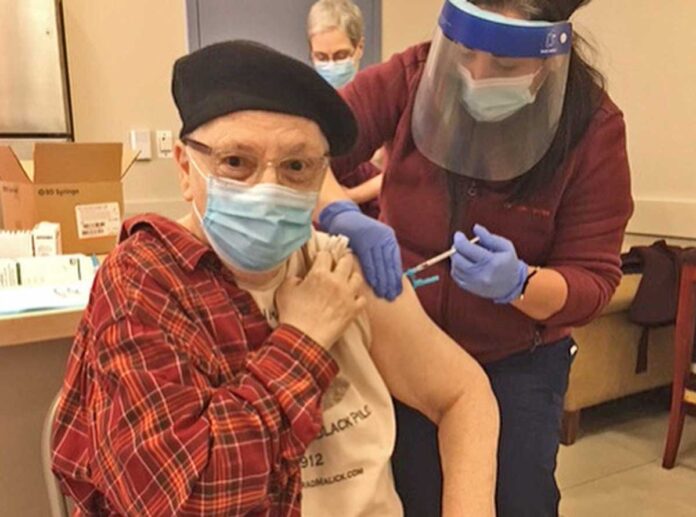Residents of the John C Anderson LGBT-friendly senior apartments received their second doses of the COVID-19 vaccine last week. The doses were given on premises via a vaccine drive coordinated by Mazzoni Center staff and Ed Miller of William Way LGBT Community Center. JCAA residents, all of whom are low-income and elderly, breathed a sigh of relief over being fully vaccinated.
“Receiving the 2nd dose for many of the residents has reignited their spirit and has allowed them to take a breath,” Miller told PGN. “I saw LGBT seniors who have rarely ventured out of their apartments since March. One senior felt ‘mentally protected and no longer in panic and anxiety mode.’ Over and over residents have shared much gratitude the vaccinations took place at JCAA and what it has meant to their well being.”
Some residents reported feeling lethargic and feverish following the second dose, while some had mild to no symptoms. Both the Moderna and Pfizer vaccines require two doses to be most effective. For the drive at JCAA, the city provided the 65 doses which were administered.
“It is important for us to do all that we can to keep our elders safe from COVID,” said Dr. Nancy Brisbon, Executive Medical Officer at Mazzoni Center. “It has been an honor for us to meet them during these two sessions. Full protection from COVID-19 is needed for everyone, but especially for our elders who are at increased risk for serious illness due to their age, or medical conditions. Full protection is only achieved two weeks after the second dose. Our team works daily on ensuring second doses are administered in a timely manner for our patients. We applied that knowledge to our session at JCAA.”
The Mazzoni team of Brisbon, Medical Assistant Supervisor Jasmine Santana, Director of Practice Management Devon Taylor, and Director of Communications Larry Benjamin said that understanding the physical space of the JCAA building as well as working closely with people like Miller allowed them to vaccinate people without massive lines and with minimal confusion.
“Our care delivery model is grounded in compassion and respect,” Benjamin said, “so we were very intentional in creating a vaccine event that did not have folks waiting in the cold or standing in line for long periods of time. We worked closely with Ed Miller to schedule appointments, collected as much information in advance as possible and distributed additional information about second dose reactions in advance of Friday.”
Both JCAA and Mazzoni Center play an active role in the local LGBTQ community. Many JCAA residents are members of LGBT organizations, and the building itself, including its garden, often serves as a space for community events. Mazzoni Center has been serving the Philadelphia LGBT community since 1979. In addition to helping protect a vulnerable segment of the population from COVID-19, the vaccine drive allowed Mazzoni staff to further get to know the community which they serve.
“We have really enjoyed the patients, hearing their stories, and knowing we’ve made this easy for them makes it worthwhile,” said Jasmine Santana, who administered the vaccines. “We had the time to vaccinate some new people as well with 1st doses and look forward to going back as long as the supplies and space allow.”
Devon Taylor, who filled out vaccination cards, kept the timer for patient observation, and coordinated residents’ information, said she is looking forward to keeping in touch with the people the team was able to help.
The city of Philadelphia, like much of the rest of the country, is still seeing far fewer vaccine doses made available compared to the surging demand. Mazzoni Center currently has over 6,000 patients, many of whom have high risk medical conditions, but is receiving at most 200 vaccine doses per week. At that rate, it would take at least seven months to give first doses to all patients and staff.
Despite the shortage, Mazzoni Center staff is still working to be as efficient as possible with the allotment, including adapting their building’s open space and changing workflow to safely accommodate as many patients as possible.
“We have balanced our capacity in terms of the number of doses received with our staffing and meeting the city’s vaccine guidelines,” Benjamin told PGN. “It is another outcome of not having enough doses to give to everyone from the very beginning. We were pleased to see the addition of HIV [to group 1B] which allowed us to vaccinate more of our patients during the 1B phase. We are also looking forward to holding community events [such as the JCAA drive] for people eligible under city guidelines if we receive the doses to do so.”
Currently, Philadelphians in phase 1A and 1B are eligible for vaccination. The city, which receives its vaccine supply directly from the federal government, hopes to move to phase 1C by the end of April.

